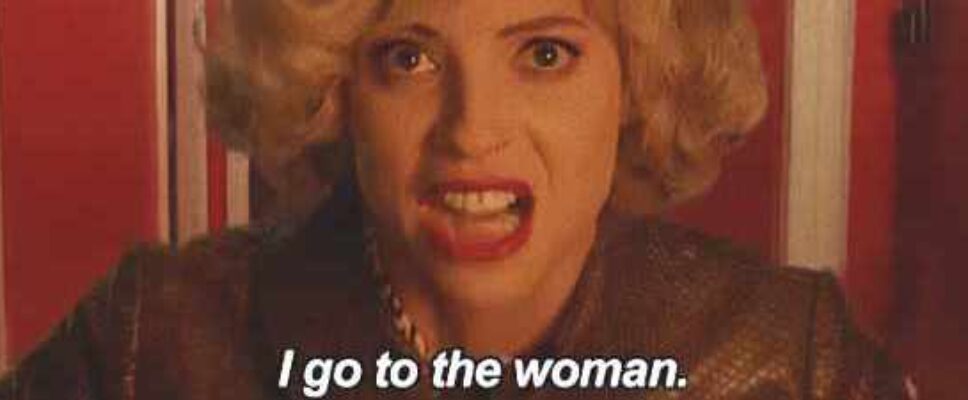Teresa Reviews The Pale Horse (2016)
Teresa Reviews The Pale Horse (2016), an episode from Les Petits Meurtres d’Agatha Christie, and wished it handled the supernatural more realistically.
(c)2023 by Teresa Peschel
Fidelity to text: 3½ knives
 It’s all there buried behind the bizarre carnival trappings, with an added evil stepmother scheming to inherit.
It’s all there buried behind the bizarre carnival trappings, with an added evil stepmother scheming to inherit.
Quality of movie: 3½ knives
 Marlène shines in a character-appropriate way. I’d have given it 4 knives if it had spent more time at the carnival and correctly addressed the supernatural.
Marlène shines in a character-appropriate way. I’d have given it 4 knives if it had spent more time at the carnival and correctly addressed the supernatural.
Read more of Teresa’s Agatha Christie movie reviews at Peschel Press.
Also, follow Teresa’s discussion of these movie on her podcast.


This version of The Pale Horse is flawed, but no more so than the other three adaptations. In this case, you don’t spend enough time with the witches, the scheming relatives, or what possessed Marlène, and far too much watching Laurence chase Dr. Maillol, the pathologist.
The carnival where the witches hold court is suitably bizarre but it’s also virtually empty of visitors which made zero sense. I understand that M. Dacosta (Mr. Venables) feels some sentiment towards his first carnival but even the most sentimental businessman shuts down an obvious money-loser like this. Where were the crowds? Was too much $$ spent on set dressing so the production couldn’t afford extras? How about more backstory about his life on the edges of respectable show business, how he got so rich, his dealings with carnies, his creepy, hulking, mute manservant, or how he met his witches?

The second witch most definitely has some power. Irène (Sybil Stamfordis) gets possessed and has something speak through her on a regular basis. Moreover, she doesn’t like it. It’s becoming harder to open herself up to an entity from the astral plane and more frightening. If Irène began her occult practices for fun, she’s learning that it involves real peril.

Which is why she gets drugged and knifed and her body left in a carnival ride. Interestingly, Père François (Father Gorman) gets knifed in the same fashion in his church. This piece of sloppiness gives Laurence something to investigate, proving that Père François wasn’t delusional and his mysterious list of names something to be discarded.
And, in fact, Laurence investigates the deaths of the names on the list but you won’t see the police work. Instead, you’ll waste far too much time with our three chers amis and Dr. Maillol. He assumes much of Mark Easterbrooke’s role, including getting Avril to pretend to be his much younger, estranged wife. Marlène (to her great joy) pretends to be his mistress, whom he’d marry if only the evil wife died under not too suspicious circumstances.



Once Laurence investigates Père François’ murder, we meet Lucien Cornille (Zachariah Osbourne). He’s a dweeby, irritating pharmacist eager to assist the police in their inquiries. He’s also not nearly as smart as he thinks he is, proven when Laurence investigates Dacosta based on Cornille’s tip. Dacosta is on crutches, a result of his muscular dystrophy. He could have never knifed anyone unless they were tied up and drugged, something Père François was not.
Cornille’s behavior is living proof of why so many criminals get caught. But if he hadn’t made a spectacle of himself, Agatha would have written a quite different novel.
There’s a simple rule that far too many criminals don’t follow: shoot, shovel, and shut up. The shutting up is the hardest part of the rule. Everyone wants to brag about how clever they are, how they put one over on the police or their boss or their spouse. Shutting up is the sensible thing to do because the last thing a criminal mastermind should do is draw attention to himself. If Cornille had never come forward as a witness, the investigation would not just have taken far longer. It probably would have failed.
And thus — you could say it’s Karma — Cornille seals his fate. He draws attention to himself. And when Laurence points out his mistake in fingering Dacosta, he doubles down and insists he can’t be wrong.
The film does one thing very right. Thallium poisoning is difficult to diagnose because it masquerades as so many other illnesses. The one thing they all have in common is hair loss and indeed, Francine and Avril both lose some hair. Dr. Maillol making the connection is plausible and well-integrated.

Accepting that something was there would shake his world view too much. This is exactly like the response in Témoin Muet (Dumb Witness). The supernatural rears up and everyone pretends nothing happened. That may be realistic in real life, but it’s not good storytelling.



